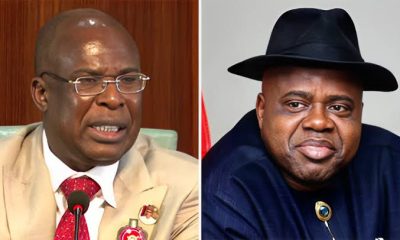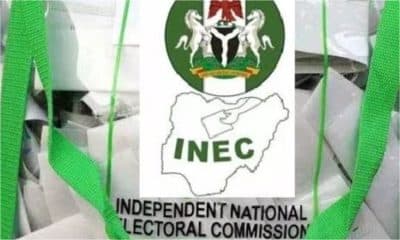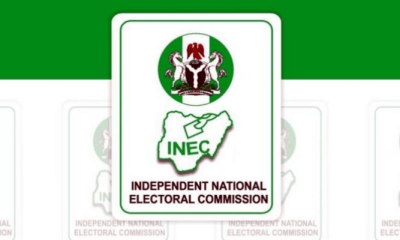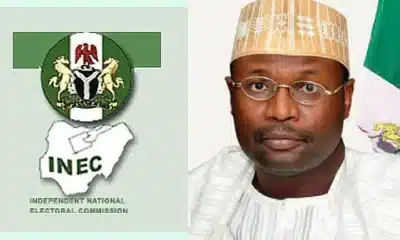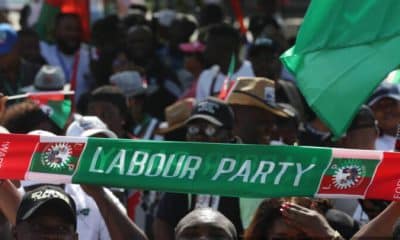Nigeria News
INEC, CSOs Bicker Over 2023 Election Coverage, Reports

The majority of the Civil Society Organisations (CSOs) which covered the 2023 general election have expressed dissatisfaction about the querying of the authenticity of their coverage and reports of the polls.
Naija News understands that the Independent National Electoral Commission (INEC) has blamed CSOs for causing controversies with their reports on the 2023 general election.
The Commission had argued that the number of polling units covered by most of the CSOs who registered with the commission for coverage was far too little to give generalised reports.
According to checks by The Guardian, none of the local or foreign observers accredited for the elections deployed up to 10 % (17,661) of the 176,606 polling units across the country used for the exercise.
A development that questions the reliability, objectivity, and accuracy of assessments given by most of these CSOs.
According to the INEC, 190 local and 34 foreign observer groups applied and were accredited to observe the last elections.
However, the overall deployment statistics showed they did not make adequate provisions for personnel to cover the grounds in each of the 36 states and Abuja.
While some of the groups sent a minimal number of observers to the 36 states and Abuja, the majority could only cover a few states, with many deploying as little as one observer to a state.
The commission conducted elections in 176 606 Polling Units (PUs), spreading across 8,809 Wards in 774 Local Councils in 36 states and the FCT, Abuja.
But experts have argued that to get an objective and near-accurate assessment of such a massive exercise; an observer group should adequately cover at least 60 % of the total polling units across the country, translating to 105,963 PUs
According to the observer groups’ figures submitted to INEC, “YIAGA Africa purportedly deployed 5,676 observers across the 36 states and the FCT. While it sent 1,027 observers to the FCT, which has 2,822 Polling Units (PUs), only 469 observers were deployed to Kano State with 11,222 PUs; 425 observers went to Delta State with 5,863 PUs; 258 observers covered Lagos with 13,325 PUs; 117 observers went to Anambra with 5,720 PUs, while only 110 observers went to Niger State with 4,950 PUs.
“The Centre for Democracy and Development (CDD) purportedly deployed 5,345 observers to the 36 states and Abuja. 168 observers were sent to Benue State with 5,102 PUs; 124 to Imo State (4,758 PUs); 98 to Ondo State (3,933 PUs); 84 to Taraba State (3,597 PUs), 73 to Zamfara State (3,529 PUs) and 78 to Kebbi State (3,743 PUs).
“The Nigerian Civil Society Situation Room/Policy and Legal Advocacy Centre presumably deployed only 2,410 observers nationwide, out of which 101 observers went to Oyo State with 6,390 PUs; 102 to Katsina State (6652 PUs); 63 to Adamawa State (4,104 PUs); 72 to Rivers (6,866 PUs); 50 to Plateau State (4,989 PUs) and 80 to Kogi State (3,508 PUs), among others.
“The Cardinal Onaiyekan Foundation deployed just 92 observers to 30 states, which include three observers each to Lagos, Nasarawa, Niger, Sokoto, Taraba, Enugu, and Abia states; and one observer each to Akwa Ibom, Anambra, Bauchi, Benue, Imo, Ondo, and Rivers states.
“On its part, ActionAid sent 700 observers to 17 states, including 103 to Enugu State; 118 to the FCT; 84 to Kano State; 14 to Niger State; 74 to Rivers State, one to Imo State, 108 to Lagos State and 15 to Yobe State.
“The Civil Society Legislative Advocacy Centre (CISLAC) deployed 190 observers to 15 states, including 30 each to Benue and Borno States; 25 to Kaduna State; and one each to Cross River, Delta, Gombe, Katsina, Kebbi, Kogi, and Plateau states.”
Also, the European Election Union Observation Mission (EU-EOM) could only muster 172 observers for the 36 states and Abuja. While it sent the highest number of observers – 74 to Abuja alone, 16 observers were deployed to Lagos State, and 8 each were sent to Kano and Plateau states. Only one observer each went to Kebbi, Kogi, Ogun, Ondo, Taraba, Yobe, and Zamfara states, among others.
“The International Republican Institute (IRI) assigned 50 observers to 10 states, with 41 of them covering Abuja alone with the remaining nine sent to nine states – Adamawa, Delta, Ebonyi, Imo, Kaduna, Kano, Ondo, Osun, and Plateau states.
“Also, the National Democratic Institute (NDI) deployed 100 observers to 11 states, with 89 or 89 per cent of the total number covering the FCT alone. The ECOWAS Mission engaged 284 observers for 31 states, 75 of which covered the FCT, 27 went to Lagos state; 21 to Kano state; seven to Niger state, and three each to Abia, Cross River, Ebonyi, Imo, and Osun states among others,” the document revealed.
Meanwhile, CSOs have disagreed with INEC’s position that they did not deploy enough personnel to monitor the election to provide adequate information to present credible results.
The Convener of the Situation Room, Mr. Yinua Zakari Yau, told The Guardian, “Election observation anywhere in the world works on a statistic from the samples and write its report based on the information from the field. We stand by our report and insist that it is credible and objective by all standards.
“We are not expecting INEC to challenge CSO’s reports, but to work on identified flaws to improve on subsequent elections. It is a known fact that iRev did not work. This is against its promise to all Nigerians. It is also a known fact that INEC staff and materials did not arrive early at some polling units and this has become a recurrent decimal that they need to work on. We can continue to mention inherent flaws identified in the last elections.
“The truth is that the time has come to review how electoral officers are appointed. We saw former President Muhammadu Buhari signing appointment of some INEC commissioners a few hours to handing over to President Bola Tinubu and these people are card-carrying members of some political parties. The case of what happened in Adamawa state has political undertone, and the country must provide solutions to all these issues.”
However, a source said that the implication is that no observer group can authoritatively produce an overall accurate and objective assessment of the 2023 general election.
“Nigeria is vast and massive geographically. Therefore, for the 2023 elections, the best thing is for each observer group to produce its report based only on the areas that it covered and does so fairly. Doing otherwise would amount to a conjecture and outright dishonesty. But what we have seen is that every observer group is now making definitive statements as if it covered the entire country, which is really not the case. This is quite sad.
“Interestingly, the Nigeria Civil Society Situation Room, which deployed about half of the number of observers deployed by YIAGA and the CDD, has curiously been more vocal about the election than everybody else. It has made several statements about the elections, which gave the impression that it adequately covered the entire country when it did not,” the source said.

